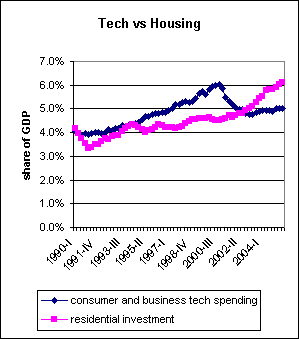The housing bubble
is bigger (in terms of the percentage of GDP) than the technology run-up that everyone now admits was a speculative bubble.

It's official: The housing bubble is now bigger than the tech bubble.
The dark blue line is consumer and business spending on technology (hardware and software), as a share of GDP. The light purple line is residential investment, as a share of GDP.
In the third quarter of 2005, Americans spent 6.1% of GDP on building new homes or renovating existing ones. That's a bigger share of the economic pie than tech got at the height of the boom
To me, this has become a no-brainer. These levels of residential spending are not sustainable, guaranteeing a housing downturn in 2006 (incidentally, as far as I can remember, this is the first time I've made this forecast). And the downturn will likely be sharper than most people expect, including a drop in median home prices nationwide.

4 comments:
And if you run the OFHEO index numbers, you get a drop in values of around 40% just to get back to trend (+/- depending on location). Reversion to the mean is a killer.
There is no free launch. Currently we are borrowing from the future to sustain our lifestyles and the status quo. The tragic part is that we cannot avoid the inevitable - law of (financial) gravity aka "reversion to the mean" .
holland is right. Well put.d
On yesterday's Financial Sense, David Vaughn posted the following quote from China Daily:
“Some (Chinese) economists have been appealing to the State Administration of Foreign Exchange to expand China's gold reserve after the Renminbi appreciation in a bid to reduce the country's reliance on the greenback.” “China should increase its gold reserve from 600 tons to about 2,500 tons in a short term and to 3,000 tons in a long term to cope with the versatile exchange rate risks, said Teng Tai, an economist of China Galaxy Securities Company. Too little gold reserve would pose threat not only to China, but also to the global monetary system, Teng said.” “China should increase gold reserve to reduce the foreign exchanges risks and diversify its state reserve with various goods, like gold and oil, in the long run, said Shen Xiangrong, director of the Shanghai Gold Exchange, China's sole gold market.”
This development should be watched for. If China starts to reduce its reliance on Dollars, this means China would sell Treasuries and it would have negative impact on interest rates.
Post a Comment